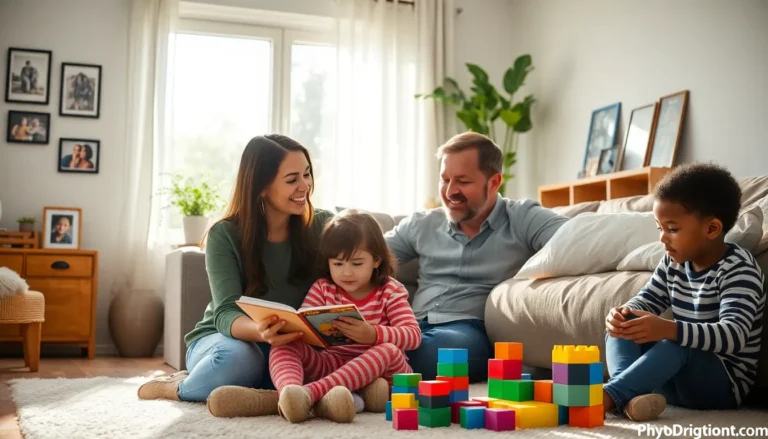Picture this: a family meeting that doesn’t involve a PowerPoint presentation or a debate over who left the milk out. Instead, it’s a space where everyone can share their thoughts, feelings, and yes, even their grievances—without the threat of a parental eye roll. Family meetings for discipline might sound about as exciting as watching paint dry, but they can transform chaos into collaboration.
When discipline feels like a tug-of-war, these meetings can be a game changer. They foster open communication and encourage kids to take responsibility for their actions. Plus, they provide a platform for parents to lay down the law without sounding like a broken record. So why not gather the crew, grab some snacks, and turn discipline into a family affair? It’s time to ditch the drama and embrace a more harmonious household.
Table of Contents
ToggleUnderstanding Family Meetings For Discipline
Family meetings for discipline offer a structured method for addressing issues, enabling families to discuss challenges constructively. They promote understanding and give everyone a voice in the discipline process.
The Purpose Of Family Meetings
Family meetings aim to foster effective communication among family members. They serve as a platform for discussing behavioral concerns while encouraging children to express their feelings. It’s essential for families to identify specific issues during these meetings, ensuring everyone understands the problem at hand. Clarifying expectations about behavior and consequences contributes to a more consistent approach to discipline. Establishing guidelines makes family members accountable for their actions.
Benefits Of Using Family Meetings
Using family meetings yields numerous advantages for family dynamics. Enhanced communication leads to a stronger connection among members. Meetings create an opportunity for children to take an active role in problem-solving, promoting responsibility. Conflict resolution becomes smoother as family members discuss their emotions and viewpoints. Additionally, the environment of shared dialogue encourages respect and understanding, essential for personal growth. Lastly, regular meetings help families stay aligned on values, increasing overall harmony within the household.
Setting Up Effective Family Meetings
Effective family meetings require careful planning and a suitable environment. This approach not only ensures everyone’s participation but also promotes a constructive dialogue.
Choosing A Suitable Time And Place
Selecting the right time and place significantly impacts the success of family meetings. Family members often respond better in a relaxed setting where distractions are minimal. Evenings or weekends work well, allowing everyone to fully engage without the stress of daily routines. When possible, choose a location that everyone finds comfortable, whether it’s the living room, kitchen, or backyard. Doing this creates a welcoming atmosphere, making it easier for family members to express their thoughts. Aim for consistency in scheduling, such as a regular time each week or month, which encourages attendance and shows commitment to the process.
Preparing An Agenda
Crafting a clear agenda helps maintain focus during family discussions. Start by identifying key topics everyone agrees to address, ensuring each item is relevant to the family’s dynamics. Prioritize important issues, allowing ample time for each to be discussed thoroughly. Including time for open discussion promotes transparency and gives everyone a chance to voice their opinions. Share the agenda ahead of time, giving members an opportunity to prepare any thoughts or concerns. By facilitating organized conversations, an agenda can effectively address behavioral issues and enhance overall communication within the family.
Implementing Discipline Strategies
Family meetings serve as an ideal platform for discussing discipline strategies, helping families address behavioral issues proactively.
Types Of Discipline To Discuss
Families should explore various discipline types during meetings. Consistent discipline promotes understanding among family members. Positive reinforcement recognizes and encourages good behavior. Time-out strategies allow children to reflect on their actions in a calm setting. Logical consequences connect behaviors with outcomes, making the lessons clearer. Discussion around natural consequences shows how actions lead to results, emphasizing responsibility. Each type fosters growth while ensuring family members maintain clear expectations. Addressing these kinds of discipline promotes unity, allowing families to align their approaches effectively.
Role Of Each Family Member
Each family member plays a vital role in the discipline process. Parents model behavior and set the tone for expectations. They should actively participate in creating strategies and establishing guidelines. Children contribute by sharing their perspectives on discipline practices, fostering open communication. Their input can lead to a better understanding of family dynamics. Siblings can support one another and hold each other accountable, reinforcing their relationships. Engaging all members in discussions encourages collective responsibility and open dialogue, ultimately enhancing a harmonious family environment.
Common Challenges And Solutions
Family meetings for discipline can encounter specific challenges. Identifying these issues and implementing effective solutions promotes a more productive environment.
Handling Resistance From Children
Children often resist participation in family meetings. Establishing a welcoming atmosphere encourages their engagement. Allowing them to express feelings and share opinions supports their involvement. Offering choices regarding the agenda can also empower children. Integrating fun elements, like snacks, further enhances their willingness to participate. When children feel heard, they are less likely to resist. Encouragement during discussions fosters mutual respect and collaboration. Lastly, addressing their concerns directly helps build trust, making future meetings smoother.
Ensuring Consistency In Discipline
Consistency in discipline is crucial for effective family meetings. Parents should establish clear expectations to achieve this. Regular check-ins during meetings allow families to revisit agreed-upon strategies. Applying the same rules across situations strengthens understanding among family members. Involving children in the decision-making process fosters ownership of their behavior. Documenting agreed-upon consequences ensures accountability. A unified approach among parents further reinforces discipline guidelines. By regularly reviewing progress, families can make necessary adjustments while maintaining cohesion.
Conclusion
Family meetings offer a transformative approach to discipline that emphasizes communication and collaboration. By creating a safe space for discussion, families can address behavioral concerns constructively while fostering accountability. This method not only strengthens family bonds but also promotes a culture of respect and understanding. Regularly scheduled meetings help families align on values and expectations, making discipline a shared responsibility. With careful planning and a focus on engagement, these gatherings can turn challenging discussions into opportunities for growth and connection. Embracing this approach can lead to a more harmonious home environment where every member feels valued and heard.






